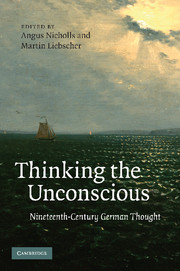Book contents
- Frontmatter
- Contents
- Notes on contributors
- Introduction: thinking the unconscious
- 1 The unconscious from the Storm and Stress to Weimar classicism: the dialectic of time and pleasure
- 2 The philosophical significance of Schelling's conception of the unconscious
- 3 The scientific unconscious: Goethe's post-Kantian epistemology
- 4 The hidden agent of the self: towards an aesthetic theory of the non-conscious in German romanticism
- 5 The real essence of human beings: Schopenhauer and the unconscious will
- 6 Carl Gustav Carus and the science of the unconscious
- 7 Eduard von Hartmann's Philosophy of the Unconscious
- 8 Gustav Theodor Fechner and the unconscious
- 9 Friedrich Nietzsche's perspectives on the unconscious
- 10 Freud and nineteenth-century philosophical sources on the unconscious
- Epilogue: the “optional” unconscious
- Works cited
- Index
Epilogue: the “optional” unconscious
Published online by Cambridge University Press: 04 August 2010
- Frontmatter
- Contents
- Notes on contributors
- Introduction: thinking the unconscious
- 1 The unconscious from the Storm and Stress to Weimar classicism: the dialectic of time and pleasure
- 2 The philosophical significance of Schelling's conception of the unconscious
- 3 The scientific unconscious: Goethe's post-Kantian epistemology
- 4 The hidden agent of the self: towards an aesthetic theory of the non-conscious in German romanticism
- 5 The real essence of human beings: Schopenhauer and the unconscious will
- 6 Carl Gustav Carus and the science of the unconscious
- 7 Eduard von Hartmann's Philosophy of the Unconscious
- 8 Gustav Theodor Fechner and the unconscious
- 9 Friedrich Nietzsche's perspectives on the unconscious
- 10 Freud and nineteenth-century philosophical sources on the unconscious
- Epilogue: the “optional” unconscious
- Works cited
- Index
Summary
In the course of the nineteenth century, concepts of consciousness underwent a transformation as competing concepts of unconscious mental functioning were developed in philosophy, physiology, biology, and psychology and psychical research in Europe and the United States. The papers in this volume have mainly traced trajectories of concepts of the unconscious in nineteenth-century German philosophical and literary thought. Alongside these philosophical developments, concepts of the unconscious were developed in other disciplines. For example, in nineteenth-century British physiology, this took place through an expansion of the concept of reflex action. Under the rubric of “unconscious cerebration,” William Carpenter (1813–85) maintained that a large proportion of mental activity takes place automatically, which is to say unconsciously. At the same time, notions of organic memory arose in German biology, based on Jean-Baptiste Lamarck's (1744–1829) theory of the inheritance of acquired characteristics and Ernst Haeckel's (1834–1919) biogenetic law that ontogeny recapitulated phylogeny. Through figures such as the German physiologist Ewald Hering (1834–1918), trans-individual and collective concepts of the unconscious were developed, wherein the unconscious was seen to contain and transmit the history of the race. However, the most lasting legacy of these developments lay in the dynamic psychologies and psychotherapies of the twentieth century. As the basis for an explanation of psychopathology, the term was taken up for a while in twentieth-century psychiatry, and more widely within psychotherapy, where it became a means of explaining human behavior in general and a new source for self-knowledge, which increasingly came to signify knowledge of what was unconscious, in some shape or form, to the self.
- Type
- Chapter
- Information
- Thinking the UnconsciousNineteenth-Century German Thought, pp. 287 - 296Publisher: Cambridge University PressPrint publication year: 2010
- 4
- Cited by



